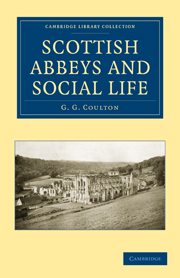Book contents
- Frontmatter
- Contents
- LIST OF ILLUSTRATIONS
- Preface
- Chapter I Celtic Monachism
- Chapter II The Monastic Rules
- Chapter III Monastic Revenues
- Chapter IV How Endowments Came (I)
- Chapter V How Endowments Came (II)
- Chapter VI Monks and Parishes (I)
- Chapter VII Monks and Parishes (II)
- Chapter VIII Charity (I)
- Chapter IX Charity (II)
- Chapter X Monk and Peasant (I)
- Chapter XI Monk and Peasant (II)
- Chapter XII Monastic Housekeeping
- Chapter XIII Church and Scriptorium
- Chapter XIV The Monastic Chronicler
- Chapter XV Schools
- Chapter XVI Art and Learning
- Chapter XVII Professions and Business
- Chapter XVIII Visitation (I)
- Chapter XIX Visitation (II)
- Chapter XX A Voice from the Cloister
- Chapter XXI Conclusion
- Appendixes
- List of Authorities
- Index
Chapter XIII - Church and Scriptorium
Published online by Cambridge University Press: 05 August 2011
- Frontmatter
- Contents
- LIST OF ILLUSTRATIONS
- Preface
- Chapter I Celtic Monachism
- Chapter II The Monastic Rules
- Chapter III Monastic Revenues
- Chapter IV How Endowments Came (I)
- Chapter V How Endowments Came (II)
- Chapter VI Monks and Parishes (I)
- Chapter VII Monks and Parishes (II)
- Chapter VIII Charity (I)
- Chapter IX Charity (II)
- Chapter X Monk and Peasant (I)
- Chapter XI Monk and Peasant (II)
- Chapter XII Monastic Housekeeping
- Chapter XIII Church and Scriptorium
- Chapter XIV The Monastic Chronicler
- Chapter XV Schools
- Chapter XVI Art and Learning
- Chapter XVII Professions and Business
- Chapter XVIII Visitation (I)
- Chapter XIX Visitation (II)
- Chapter XX A Voice from the Cloister
- Chapter XXI Conclusion
- Appendixes
- List of Authorities
- Index
Summary
Let me begin here by recalling my readers to what I said at the very outset; “I regard monasticism as one of the great formative forces in the social life of the Middle Ages; in certain times and in certain places, I would call it even the greatest and most beneficent force”. In the twelfth century, it did more than anything else to bring Scotland into line with general European civilization. But it changed rapidly in character; indeed, the rapidity of its change was commensurate with its rapid success. It would be almost as misleading to judge this enormous institution exclusively from its first beginnings, or even from its adolescence or early manhood, as to judge modern America from the Pilgrim Fathers. For good or for evil, while the monk impressed himself upon the world, society also impressed itself upon the monk. It might almost be said that he had begun as an anti-capitalist; but certainly, after a few generations of rich endowment, the majority yielded as we should expect, and became definite capitalists. On the whole, it was a beneficent squirearchy; but, when we consider it closely as it actually was, we may well feel glad that the monk of today is far more likely to be a man of true religious vocation than a younger son drifting into a well-endowed community, much as Trollope's or Jane Austen's clergymen had drifted into family livings.
- Type
- Chapter
- Information
- Scottish Abbeys and Social Life , pp. 154 - 164Publisher: Cambridge University PressPrint publication year: 2010First published in: 1933



